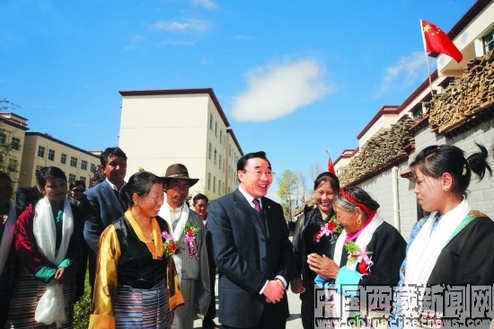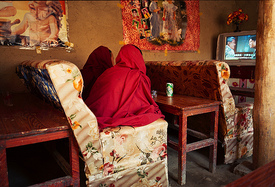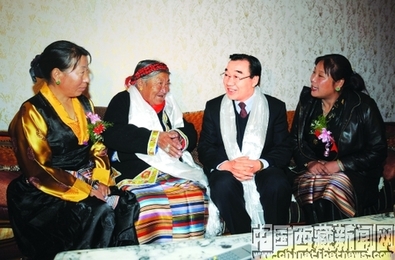
If you tuned in to Tibet TV this October, you would have heard an announcer proudly report that from the early hours of the morning of the 18th the residents of Trunglha village near Lhasa, were busy "gaily festooning the area with fresh flowers and colored streamers." The occasion? The relocation of the villagers into their new model "middle class society village" imaginatively named Red Flag Village.
According to Tibet TV (XZTV), a Chinese state-owned channel operating out of Lhasa that claims to reach over 400,000 viewers across the Tibetan plateau, the villagers were "laughing with joy" as they gathered to welcome Tibet's Communist Party leader, Zhang Qingli.
One particularly ecstatic resident tells the reporter, "Our smoky old Trunglha village has transformed into the civilized and wealthy Red Flag new village! And our moving into this beautiful and spacious new habitat is due to the Communist Party's great kindness".
The report is so over-the top as to fall into the realm of the absurd. But a closer look at the Tibet TV report reveals the well-worn pages of Chinese propaganda in Tibet.
Here is Tseten, a 65-year-old Tibetan resident telling Zhang Qingli what a pitiful place the village used to be. "Formerly our village was called Trunglha and it was widely known to be poor. There was rubbish and mess everywhere. During the dry season there was no end of dust from passing trucks, and during the rainy season the streets and paths became filled with mud".
Whenever a Tibetan hears the word 'Trunglha' they will immediately think of the Dalai Lama because Trunglha Yarsol is the celebration of his birthday, which falls on July 6th. Trunglha village was a popular place for Tibetans to come and celebrate this occasion every Summer. The TV report is overtly associating the village with backwardness, poverty, dirt and chaos. But it is also less directly linking these undesirable qualities with Tibet's spiritual leader and its pre-Communist past. It's worth noting that Zhang Qingli, the honored guest in the village that day, is the same man who described the Dalai Lama as "a monster with a human face" and "a monk in wolf's clothing". He is also currently being investigated by the Spanish High Court for crimes against humanity.

Tibet's Party Leader Zhang Qingli greets the residents of Red Flag Village
Trunglha was one of a collection of villages that was named Red Flag Township after the Chinese Communist invasion of Tibet in 1959. It had already rather redundantly been re-named Red Flag Village a number of years back. So why such a big to-do about it now? Certainly the relocation is something that the Lhasa officials would wish to promote as evidence of the Party's concern for the well being of the masses. "Chinese media is all about the feel good story", notes Dr. John Powers, who writes books on Chinese propaganda. But the occasion is also used to make pointed political observations that are clearly intended to remind everyone of the Communist Party's views on the highly sensitive topic of the Dalai Lama and the bond that Tibetans have with him.
As Dr. John Powers points out, attacks on the Dalai Lama are nothing new in China. But signs are that this kind of propaganda may be escalating. A report by the Epoch Times (10 April, 2008) describes a marked increase in propaganda on the subject of Tibet on CCTV, China's main state-run channel. Apparently, the station doubled the airtime it devotes to Tibetan issues in recent months, presumably in response to the protests there this Spring, and much of the present coverage is along the same lines as the Red Flag Village report, proclaiming the 'happy life' of Tibetans in Tibet.
And the government wants to make sure that the people are watching. In July 2005, the People's Daily ran a story on a pilot project in a village near Lhasa, where the state-owned Bureau of Radio and Television had installed cable and given a new TV set to each of the 217 households. The story focused on one lucky villager called Aunt Basang. 'She has been in front of the TV screen after a day's work since digital TV was installed', says the article, 'often watching TV until the small hours of the following day'.
According to the People's Daily, the red line of Chinese characters on each TV set reads, 'Gifts for 10,000 households by Publicity Department of the Central Committee of the Communist Party of China (CCCPC), Civilization Administrative Office of CCCPC and the State Administration of Radio, Film and Television'.
A government giving away free access to a media it controls is rather like a burglar giving away free locks. You may be forgiven for being suspicious of the intentions.
The Red Flag Village report continues with Tseten complaining about the celebrations of the Dalai Lama's birthday. "Some ill-intentioned miscreants used to come and illegally celebrate Trunglha Yarsol here, marking the birthday of the 14th Dalai, so our village was filled with smoke and we couldn't get any work done. If the government had not banned the illegal Trunglha Yarsol celebration in 1999, it goes without saying that our village would be in a terrible state by now".
Tibetans traditionally celebrate the birthday of the Dalai Lama by burning incense as an offering. But it's hard to imagine a few sticks of incense one day a year creating such difficult environmental conditions that the villagers are unable to work. It's also hard to imagine anyone over the age of nine believing that it could.
The use of the truncated 'Dalai' instead of 'Dalai Lama' is purposefully disrespectful, and the depiction of followers of the Dalai Lama as "ill-intentioned miscreants" significant. As far as the Chinese government is concerned, these people are troublemakers who want to return Tibet to its dark feudal past. They are against progress and against the Party, which seeks to occupy the spot that Tibetans reserve in their hearts for the Dalai Lama and Buddhism. Zhang Qingli has even been quoted as saying that "The Central Party Committee is the real Buddha for Tibetans".
So who is buying this? No one according to Tenzin Losel, a Tibetan human rights researcher with the International Campaign for Tibet. Losel was raised in Lhasa and now lives in Dharamsala, India. "Tibetans and Chinese both understand that the government report only the good things, never the bad. It's clear that these people are coached. You can see from the way they speak they're trying to think about what they're supposed to say next. We see it as more like an annoyance. When they criticize the Dalai Lama on the TV, my mother would just say, 'Change the channel'".
Kunga Samten, a former monk, also grew up in Tibet. "No Tibetans believe it," he says. "They know it's all fake." Samten is from a nomadic family and when he would watch stories like Red Flag Village on TV, especially those where Party officials visit nomad villages, he says he could easily see that it was staged. "The villagers will be in their best clothes when they're supposed to be working. The authorities tell people what to wear, what to do, and what to say".
Referring to the Dalai Lama's birthday celebrations, a middle-aged Party member Tsering Norbu, continues in the same stilted manner. "Everyone in the village was delighted when the illegal ceremony was banned, and unanimously aspired to the renaming of the village as Red Flag village. The new name means following the Party single-mindedly and enjoying a rapidly improving livelihood."
Stirring stuff. But what's interesting is the reference to the ban on the celebration of the Dalai Lama's birthday, which was actually enforced several years prior to 1999. It's considered such an important part of China's control in Tibet that there was a rally in August 1999 commending officials on their handling of that year's Trunglha Yarsol rituals. Of course, the rally was reported on Tibet TV.
But this has actually been one of the most difficult measures to enforce, a fact proven by the authorities' repeated pronouncements against it. In 2000, security personnel were even stationed around incense-burners in the city, an image symbolic of China's bizarre conundrum in Tibet where force and faith collide.
The following year, in a scene right out of Monty Python, Public Service Bureau officials were keeping watch over popular picnic spots and even fined a group of Tibetan youths 500 yuan each (around $70) for picnicking at a park. One can imagine this crack police squad crouching in the shrubbery waiting for unsuspecting Tibetan families to sit on a blanket and unpack a tub of dumplings.
Over the years, there have been repeated public notices such as the one issued in Lhasa in June 2001, which states that Tibetans are not permitted to "give prayers and blessings" for the Dalai Lama or to "eulogize his merits and virtue". Strangely, the notices themselves, which are aimed at discrediting the Dalai Lama, seem to be a reminder that he has merits and virtue worth eulogizing.
A Propaganda Department study manual, issued to county-level education offices in the Tibetan Autonomous Region in 2002, explains the reasons why the government outlawed the Dalai Lama's birthday celebrations--one of them being that the Tibetans themselves had requested the ban.
It is an illegal activity to make power for the head of the splittist group, the Dalai. [...] The facts show that trunglha yarsol has been deliberately used by the antagonists as a weapon for the splitting force to carry out its splittist plot, antagonistic propagation and penetration [...]. Secondly, all kinds of problems happened during the time of trunglha yarsol activity and incidents caused by them have offended the constitution and law of the country, severely affected the masses' normal production, life, work and studying order, affected the unity of the nationalities and so its social harm is significant. Thirdly, the numerous cadres and masses are discontented about trunglha yarsol activity and are strongly demanding that the government take measures to punish and ban it.
Apparently, the 'problems' included traffic accidents, presumably because of all the smoke from that pesky incense.
Punishments and measures such as prohibiting farmers from selling incense on religious days, salary-cuts, demotions, fines, expulsions from jobs--even picnic spot stake-outs; none of these seem to have had much affect on discouraging the Trunglha Yarsol. And when this recent Tibet TV report highlights the fact that the celebration was banned over a decade ago, it seems like an accidental admission of this failure.
The Tibet TV report says that Party Secretary Zhang Qingli was "delighted by the villagers' comments". He then talks about various policies of government planning and rural schemes, which apparently prompted "wave after wave of joyous applause from the villagers".
The tone of the propaganda differs depending upon the audience, says Tenzin Losel. "If it's aimed at Chinese people and in Chinese language, then the terminology of the propaganda is more subtle. When it's in Tibetan it's more like the language of the Cultural Revolution." This is largely because of the Chinese Han view of Tibetans as being backward and unsophisticated. But it seems they may be seriously under-estimating the ability of Tibetans to know when they're being spun.
"My friends and I would only believe international stories," says Kunga Samten. "Anything to do with China and Tibet we didn't accept." Samten had never been exposed to a free press until he came to India. "Now when I see someone reading a newspaper I think that person is trying to stay informed. Back in Tibet if I saw someone reading a paper I used to think, 'Now, there's a flower of the Communist Party.'"
If anyone had missed the bit about the Party's kindness, the Red Flag Village report makes sure that they get the message in terms that make one feel as if the Cultural Revolution is in full swing.
As the red flag spangled with gold stars bore witness to the happy occasion, there was no way for the villagers to forget the great kindness of the Party...The villagers said, "We could no more forget the honorable secretary than a water fetcher could forget the well...We are living happily in the great Socialist family and can never forget the Party's kindness. Following the 3/14 incident, the various management activities in the villages have been intensified. However, without the splittist and destructive activities of the Dalai Clique our progress would surely have been swifter and better".
The 3/14 incident is how Chinese media refers to the date that marked the height of this year's protests by Tibetans in Lhasa. For months afterwards, State television ran round-the-clock footage of Tibetans vandalizing shops, setting light to cars, and generally running amok.
The report concludes that Zhang "pointed at the five star red flag flapping in the breeze" and made a speech that sums up China's aspirations in Tibet--inspiring or ominous depending on your point of view.
"For this flag to fly over the next ten thousand generations, it all depends on educating the crucial generation to come. We must tell the young generation about the relocation of Red Flag village with the courage of loving the Party, loving the great Motherland, and loving the new Tibet, so that this will not decline from one generation to the next, and the sparkling red flag will fly high and forever".
And to show that he really is just a regular guy, Zhang Qingli "happily enjoyed a game of ping pong with the celebrating villagers", in the new recreation hall.
Losel has seen countless stories similar to that of Red Flag Village. "There are always a couple of people who are interviewed, who put their hands together in a gesture of prayer to the communist leaders, and say, 'Our life is so great since the Third Plenary Meeting of the CCP, blah blah'. It sounds ridiculous. I just laugh when I watch this kind of thing".
"You would not believe our story, and in fact even for us it is like a dream", gushes one of the villagers of Red Flag Village. Contrary to what the Chinese government might think, it seems that most Tibetans don't believe it either.
Rebecca Novick is a writer and Executive Producer of The Tibet Connection radio program. She is currently based in Dharamsala, India.


